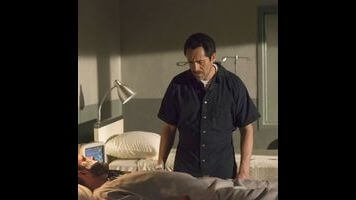The Bridge: “Eye of the Deep”

For all of the other things going on in “Eye of the Deep,” this was really Marco’s episode. Since The Bridge’s inception, Demián Bichir has been the show’s not-so-secret weapon, imbuing Marco with warmth, humanity, humor, anger, and profound soundness, the latter two emotion so clearly seen on his face as he stands in the tomb of Fausto Galvan’s eldest son. Bichir, as I’ve said so many times before in this space, is characteristically fantastic, conveying this push and pull between the good and the bad with little dialogue throughout the episode. Marco’s final showdown with David Tate has encapsulated his battle all season: Does he stay a morally upright person, or does he give in to the forces of a evil in order to receive some sort of intangible absolution from grief?
In a way, Marco’s decision to let Tate live is a foregone conclusion. As Fausto says himself—the pain from the loss of a son never lessens—even if you have the head of your son’s killer, sans eyelids, in a jar next to his eternal resting place. The comeback of David Tate could certainly have been a groan-worthy exercise, returning to the most-criticized aspect of the show. But the plot point became a demonstration of how much the show has a shifted between season one and season two. It was about Marco’s journey, rather than, say, focusing on the means that put David Tate in the prison infirmary to begin with, or Marco’s journeys through the prison system. Instead, this was an episode about an internal struggle with no solution. Marco tells Tate that he won’t get out so easily. If Marco must suffer, so shall Tate. But is killing less morally upstanding than physical torture? As Marco has said before, there are no sides.
While Marco was having his internal struggle, other external struggles are coming to the forefront. Sonya is at a loss with Marco. While I prefer them better together, she also pushes her involvement with Pintado’s investigation further by essentially making herself a target. She’s also leaving herself vulnerable on the homefront, taking Jim Dobbs’ ashes and letting the enigmatic Jack into life more and more. In the fifth episode, more than a quarter of the way through, I can say that The Bridge has succeeded in coming together in ways that made me weary during the inaugural episode of the second season. Story lines are crossing over and gelling in ways the first season was never fully able to accomplish. While not everything is perfect in the land of The Bridge, structurally it feels so more confident, bolstered by the fact that it’s actually pulling off bringing together storylines into the larger whole, while many last season felt disengaged from the arc of the last season. What’s nice about how this season is unfolding is instead of big shocks, which are somewhat inherent to the serial killer structure, The Bridge has instead decided to live the space of smaller reveals—Cerisola’s position as high-powered CEO, Buckley’s position as a CIA agent. It’s like pulling apart the layers of an onion to get to its center rather than chopping it in half.
On the flipside, Steven Linder and Charlotte Millwright still felt like afterthoughts in the grand scheme of the episode, although I suspect that will change as the season continues, especially in terms of Charlotte and Ray’s “purchase” (use of their name in exchange for their lives) of Fausto’s developments will factor majorly into future episodes. In Linder’s case, as I pointed out in “The Acorn,” his story has shifted to a point where it’s really Eva’s story, after she agrees to testify against Captain Robles for his complicity in her kidnapping and sexual assault. There are newer, more interesting characters to focus on, namely Cerisola, whose daughter, Romina, is revealed to be a junkie. The business that helps make Cerisola rich is also the one that is slowly killing his daughter. The (re)introduction of Agent Buckley, definitively naming his as a CIA agent, rather than just the gringo buddy of the assassin who killed Raul Quintana. Fausto’s reach does not just extend to his own countrymen, but has infiltrated government agencies, as well. The “This could go all the way to the top!” aspects of this season could have a cliche feel to it, especially when dealing with this type of mystery, but it has a larger purpose for the structure. By involving the CIA, it effectively brings Daniel and Adriana into the heart of the investigation, rather than relegating them to the outskirts. Sure, they’re getting a fed a story in order to give the DEA more leeway, but it’s a good story, so who cares?
Stray observations:
- I just figured out that Cerisola is played by Bruno Bichir, Demián’s brother and now I can’t unsee the similarities. Aw, family affair!!
- Um, so we can all agree not to fuck with Fausto Galvan, huh?
- So glad Cesar is back! One of the great pleasures of The Bridge is it’s side characters. If the writers wanted to do a scene between Cooper and Cesar, I’d be totally down.